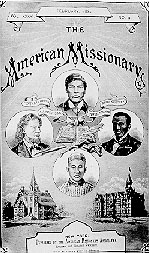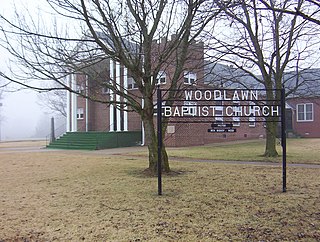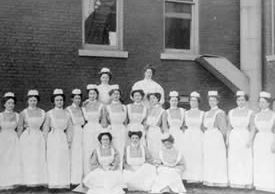
Christian Brothers University is a private Roman Catholic university in Memphis, Tennessee. It was founded in 1871 by the De La Salle Christian Brothers, a Catholic teaching order.
LeMoyne–Owen College is a private historically black college affiliated with the United Church of Christ and located in Memphis, Tennessee. It resulted from the 1968 merger of historically black colleges and other schools established by northern Protestant missions during and after the American Civil War.

Dillard University is a private, historically black university in New Orleans, Louisiana. Founded in 1930 and incorporating earlier institutions founded as early as 1869 after the American Civil War, it is affiliated with the United Church of Christ and the United Methodist Church.
Rochelle Stevens is a former 1996 Olympic gold medalist for the United States in the women's 4x400-meter relay. She was also part of the team that won the silver medal in the same event and 6th in the world at 400 meters at the 1992 Summer Olympics in Barcelona, Spain. Track and Field Head Coach at LeMoyne-Owen College since 2021.

The American Missionary Association (AMA) was a Protestant-based abolitionist group founded on September 3, 1846 in Albany, New York. The main purpose of the organization was abolition of slavery, education of African Americans, promotion of racial equality, and spreading Christian values. Its members and leaders were of both races; The Association was chiefly sponsored by the Congregationalist churches in New England. The main goals were to abolish slavery, provide education to African Americans, and promote racial equality for free Blacks. The AMA played a significant role in several key historical events and movements, including the Civil War, Reconstruction, and the Civil Rights Movement.

Fanny Jackson Coppin was an American educator, missionary and lifelong advocate for female higher education. One of the first Black alumnae of Oberlin College, she served as principal of the Institute for Colored Youth in Philadelphia and became the first African American school superintendent in the United States.

Woodlawn Baptist Church and Cemetery, also known as Woodlawn Missionary Baptist Church, is a historic building in Nutbush, Haywood County, Tennessee, in the United States. It is on Woodlawn Road, south of Tennessee State Route 19.

The Education of Memphis is home to a range of public and private institutions serving various educational needs of Memphis, Tennessee. At the primary and secondary levels, the metropolitan area is currently served by the Shelby County Schools operating system including the surrounding suburbs, a number of private schools, and some with religious affiliations. Major post-secondary institutions include the Southwest Tennessee Community College, the University of Memphis, Christian Brothers University, Rhodes College and the University of Tennessee Health Science Center.

The F. Julius LeMoyne House is a historic house museum at 49 East Maiden Street in Washington, Pennsylvania. Built in 1812, it was the home of Dr. Francis Julius LeMoyne (1798–1897), an antislavery activist who used it as a stop on the Underground Railroad. LeMoyne also assisted in the education of freed slaves after the American Civil War, founding the historically black LeMoyne–Owen College in Memphis, Tennessee. His house, now operated as a museum by the local historical society, was designated a National Historic Landmark in 1997. It is designated as a historic public landmark by the Washington County History & Landmarks Foundation.

Roger Williams University was a historically black college in Nashville, Tennessee. It was founded in 1866 as the Nashville Normal and Theological Institute by the American Baptist denomination, which established numerous schools and colleges in the South. Renamed for Roger Williams, the founder of the First Baptist Church in America, it became the largest Baptist college in the area for educating African Americans. It was founded in a period when Protestant mission groups sponsored numerous educational facilities for freedmen in the South.
Dickerson LeMoyne Shillicutt Wells is an American preacher from Memphis, Tennessee in the Church of God in Christ and was the youngest minister, at the time in 1978, to be ordained as a clergyman in the COGIC denomination in the state of Tennessee.
The following is a timeline of the history of the city of Memphis, Tennessee, US.
Margaret Callender McCulloch was a writer, teacher, and activist during the civil rights movement. McCulloch authored several books and articles on race relations and the segregation of African Americans, as well as two biographies. Her most influential books included Segregation, a Challenge to Democracy and Integration: Promise, Process, Problems. The Amistad Research Center at Tulane University in New Orleans, Louisiana houses McCulloch's articles, speeches, and correspondences.
African Americans are the second largest census "race" category in the state of Tennessee after whites, making up 17% of the state's population in 2010. African Americans arrived in the region prior to statehood. They lived both as slaves and as free citizens with restricted rights up to the Civil War.
Maxine (Atkins) Smith born in Memphis, Tennessee, United States, was an academic, civil rights activist, and school board official.

The Memphis Baptist and Normal Institute was a historically Black college founded in 1888 by Peter Howe of Illinois. It was one of the earliest private educational facilities for African Americans in Memphis. The date it changed name to Howe Institute is unknown, but it was before 1910.
Green Polonius Hamilton (1867–1932) was an American educator, principal, and author who was prominent in the African-American community of Memphis, Tennessee.

Freedmen's Schools were educational institutions created soon after the abolition of slavery in the United States to educate freedmen. Due to the remaining opposition to equality between blacks and whites, it was difficult for the formerly enslaved to receive a proper education, among a myriad of other things. Schools were made especially for blacks but were open to anyone regardless of race. These schools were far from perfect; however, they did give African Americans hope and opportunity for their future.











